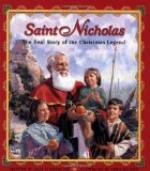“What! Did you set a sheaf of wheat for the birds on Christmas Eve?” asked the Child, drawing closer and bending kindly eyes upon Pierre.
Now the boy saw that where the Stranger stood the snow had melted all away, so that they were inclosed in a little space like a downy nest, which seemed almost warm to his limbs.
“Yes, I set out a wheat-sheaf,” said Pierre simply. “Why not? I love all the little creatures whom our Lord Himself so dearly loved, and to whom He bade us be kind. On Christmas Eve especially I always tried to make happy those which He sent in my way,—poor little wanderers as well as our own friends at home.”
The Child drew yet closer and sat down in the snow beside Pierre. His beautiful eyes shone like stars, and his voice was like sweet music. “What,” he said, “you are the boy who stood in the doorway with a pan of bread and milk,—part of your own supper,—and called the hungry kitten to feast? You are the same who tossed a bone to the limping dog and made him a bed in the stable? You stroked the noses of the ox and the ass and said gentle things to them, because they were the first friends of the little Jesus? You set the sheaf of wheat for the snow-birds, and they lighted upon your hands and shoulders and kissed your lips in gratitude? You are that boy, friend of God’s friends. No wonder that my white dove flew to you out of the storm. She knew, she knew!”
The Child bent near and kissed Pierre on the cheeks, so that they grew rosy, and the warm blood went tingling through his little cold limbs. Sitting up, he said: “Yes, I am that boy who last year was so happy because he could do these pleasant things. But how do you know, little Stranger? How did you see?”
“Oh, I know, I saw!” cried the Child, gleefully clapping his hands as a child will. “I was there. I passed through the village last Christmas Eve, and I saw it all. But tell me now, how do you come here, dear boy? Why are you not in that happy home this stormy night, once more making the Lord’s creatures happy?”
Pierre told all to the Child: how his dear father and mother had died and left him alone in the world; how the home had been sold, and now he lived in the charity school kept by the good Abbe; how he had learned of the chance to earn a few pennies by singing on Christmas Day in the neighboring village church, which lacked a voice among the choir-boys; how he was on his way thither when the storm had hidden the road, and he had grown so cold, so cold!
“Then your dove came to me, little Stranger,” Pierre concluded. “She came, and I folded her in my jacket to keep her warm. But, do you know, it must be that she has kept me warm. Although I could walk no further, I am not cold at all, nor frightened, and no longer hungry. Sit close to me, little Stranger. You shall share my jacket, too, and we will all three warm one another.”
The Child laughed again, a low, soft, silvery laugh, like a happy brook slipping over the pebbles. “I am not cold,” he said. “I cannot stay with you. I must go yonder.” And he pointed through the snow.




